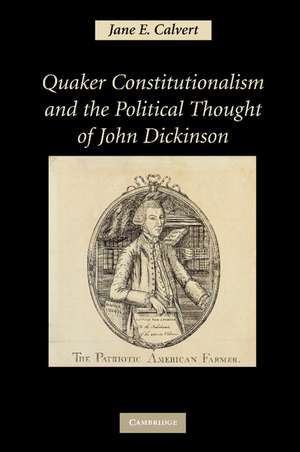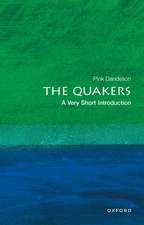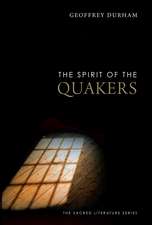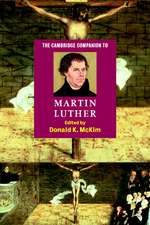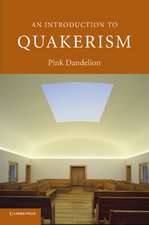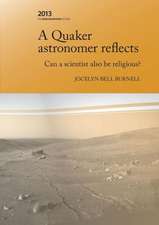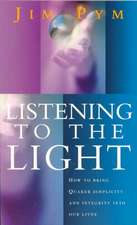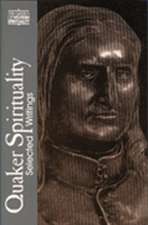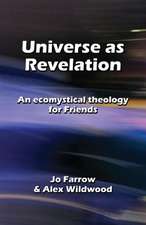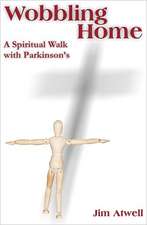Quaker Constitutionalism and the Political Thought of John Dickinson
Autor Jane E. Calverten Limba Engleză Paperback – 9 mai 2012
| Toate formatele și edițiile | Preț | Express |
|---|---|---|
| Paperback (1) | 275.47 lei 6-8 săpt. | |
| Cambridge University Press – 9 mai 2012 | 275.47 lei 6-8 săpt. | |
| Hardback (1) | 817.68 lei 6-8 săpt. | |
| Cambridge University Press – 7 dec 2008 | 817.68 lei 6-8 săpt. |
Preț: 275.47 lei
Nou
Puncte Express: 413
Preț estimativ în valută:
52.73€ • 57.29$ • 44.32£
52.73€ • 57.29$ • 44.32£
Carte tipărită la comandă
Livrare economică 21 aprilie-05 mai
Preluare comenzi: 021 569.72.76
Specificații
ISBN-13: 9781107404359
ISBN-10: 1107404355
Pagini: 398
Dimensiuni: 152 x 229 x 23 mm
Greutate: 0.58 kg
Editura: Cambridge University Press
Colecția Cambridge University Press
Locul publicării:New York, United States
ISBN-10: 1107404355
Pagini: 398
Dimensiuni: 152 x 229 x 23 mm
Greutate: 0.58 kg
Editura: Cambridge University Press
Colecția Cambridge University Press
Locul publicării:New York, United States
Cuprins
Acknowledgments; Abbreviations; Introduction; Part I. Quaker Constitutionalism in Theory and Practice, c.1652–1763: 1. Bureaucratic libertines: the origins of Quaker constitutionalism and civil dissent; 2. A sacred institution: the Quaker theory of a civil constitution; 3. 'Dissenters in our own country': constituting a Quaker government in Pennsylvania; 4. Civil unity and 'seeds of dissention' in the golden age of Quaker theocracy; 5. The fruits of Quaker dissent: political schism and the rise of John Dickinson; Part II. The Political Quakerism of John Dickinson, 1763–89: 6. Turbulent but pacific: 'Dickinsonian politics' in the American revolution; 7. 'The worthy against the licentious': the critical period in Pennsylvania; 8. 'The political rock of our salvation': The US Constitution according to John Dickinson; Epilogue: the persistence of Quaker constitutionalism, 1789–1963; Bibliography; Index.
Recenzii
“In exploring Dickinson, Quaker theology, Revolutionary political thought, and the relationships between them, Calvert has invited us into fresh territory, and she has done so with graceful style.” —Emma Lapsansky-Werner, Journal of Law & Religion
“Jane E. Calvert’s book is the culmination, to date, of that collective effort [to take Quakers seriously], the keystone in an arch of scholarly writings that opens the way to a thoughtful and stimulating reconsideration of Quakerism. …This is a scholarly accomplishment of note and it will, I hope, generate some restating of revolutionary history.” —Alan Tully, American Historical Review
"The volume is well organized, leading the reader progressively through sections on Quakerism in general..." -Stuart B. Jennings, Church History
"In a provocative monograph, historian Jane E. Calvert puts the Quakers and John Dickinson back into the story of America's constitutional founding and American political history writ large." -Kyle G. Yolk, Journal of the Early Republic
“Calvert’s reassessment of John Dickinson’s role in the revolutionary and founding era of the United States is so much more than another ‘founding father’ biography. It is instead one of the most thorough treatments of American Quakerism in general and Quaker politics and resistance in particular. …[H]er book is essential reading to anyone interested in American reform in general, as well as the history of civil disobedience theories.” —Beverly C. Tomek, Pennsylvania History
“In a clearly argued and well researched thesis, Professor Calvert contributes greatly to the discussion [of Quaker reform] by compiling a synthesis of previous research and her own unique findings. The conclusions, though clearly developed, are not without controversy, but any future discussion will have to address many of the issues she had clearly articulated and for that we can only be grateful.” —Stuart B. Jennings, Church History
“In a provocative monograph, historian Jane E. Calvert puts the Quakers and John Dickinson back into the story of America’s constitutional founding and American political history writ large. Challenging readers to shelve preconceptions of Quakers as apolitical quietists, Calvert convincingly shows Quakers of the seventeenth and eighteenth centuries pioneering a then unique tradition of constitutional thought and political action….[C]onstitutional and political historians should join scholars of Quakers and colonial and revolutionary Pennsylvania in wrestling with Calvert’s bold claims about the Quaker influence on American popular sovereignty.” —Kyle G. Volk, Journal of the Early Republic
“Jane E. Calvert’s study is narrow and deep, showing the relationship between religion and politics within an examination of Pennsylvania Quakers and their intellectual influence on Founder John Dickinson.” —Ellen Holmes Pearson, William and Mary Quarterly
“Jane E. Calvert’s book is the culmination, to date, of that collective effort [to take Quakers seriously], the keystone in an arch of scholarly writings that opens the way to a thoughtful and stimulating reconsideration of Quakerism. …This is a scholarly accomplishment of note and it will, I hope, generate some restating of revolutionary history.” —Alan Tully, American Historical Review
"The volume is well organized, leading the reader progressively through sections on Quakerism in general..." -Stuart B. Jennings, Church History
"In a provocative monograph, historian Jane E. Calvert puts the Quakers and John Dickinson back into the story of America's constitutional founding and American political history writ large." -Kyle G. Yolk, Journal of the Early Republic
“Calvert’s reassessment of John Dickinson’s role in the revolutionary and founding era of the United States is so much more than another ‘founding father’ biography. It is instead one of the most thorough treatments of American Quakerism in general and Quaker politics and resistance in particular. …[H]er book is essential reading to anyone interested in American reform in general, as well as the history of civil disobedience theories.” —Beverly C. Tomek, Pennsylvania History
“In a clearly argued and well researched thesis, Professor Calvert contributes greatly to the discussion [of Quaker reform] by compiling a synthesis of previous research and her own unique findings. The conclusions, though clearly developed, are not without controversy, but any future discussion will have to address many of the issues she had clearly articulated and for that we can only be grateful.” —Stuart B. Jennings, Church History
“In a provocative monograph, historian Jane E. Calvert puts the Quakers and John Dickinson back into the story of America’s constitutional founding and American political history writ large. Challenging readers to shelve preconceptions of Quakers as apolitical quietists, Calvert convincingly shows Quakers of the seventeenth and eighteenth centuries pioneering a then unique tradition of constitutional thought and political action….[C]onstitutional and political historians should join scholars of Quakers and colonial and revolutionary Pennsylvania in wrestling with Calvert’s bold claims about the Quaker influence on American popular sovereignty.” —Kyle G. Volk, Journal of the Early Republic
“Jane E. Calvert’s study is narrow and deep, showing the relationship between religion and politics within an examination of Pennsylvania Quakers and their intellectual influence on Founder John Dickinson.” —Ellen Holmes Pearson, William and Mary Quarterly
Descriere
This book traces the theory of Quaker constitutionalism from the early Quakers through Founding Father John Dickinson to Martin Luther King, Jr.
